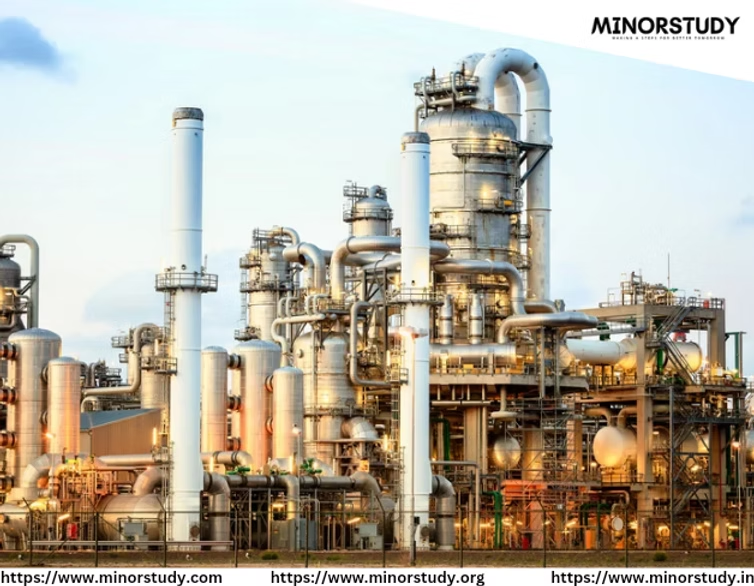Chemical Engineering: An Overview
Chemical Engineering is a branch of engineering that focuses on the design, optimization, and operation of processes that transform raw materials into valuable products. It combines principles from chemistry, physics, mathematics, biology, and economics to solve problems related to the production of chemicals, fuels, pharmaceuticals, food, and materials. Chemical engineers work on developing and improving processes, ensuring they are efficient, safe, and environmentally friendly.
- Key Aspects of Chemical Engineering
- Core Areas of Chemical Engineering
- Chemical Engineering Process
- Types of Chemical Engineering
- Applications of Chemical Engineering
- Tools and Techniques in Chemical Engineering
- Top Chemical Engineering Programs
- Career Opportunities in Chemical Engineering
- Salary Expectations for Chemical Engineers
- Challenges in Chemical Engineering
- FAQs About Chemical Engineering
- Conclusion
Key Aspects of Chemical Engineering
Aspect | Details |
Core Focus | The design, operation, and optimization of chemical processes, equipment, and systems for large-scale production. |
Key Areas | Thermodynamics, reaction engineering, process design, control systems, materials science, and environmental engineering. |
Objective | To create efficient, safe, and sustainable processes that convert raw materials into useful products. |
Challenges | Reducing environmental impact, improving process efficiency, ensuring safety, and working with complex materials and systems. |
Core Areas of Chemical Engineering
Process Engineering: The design and optimization of large-scale industrial processes used in the production of chemicals, materials, and energy. This includes designing reactors, distillation columns, and heat exchangers.
Reaction Engineering: Focuses on understanding chemical reactions and how to control and optimize them to maximize efficiency, yield, and safety in industrial settings.
Thermodynamics: The study of energy and its transformation in chemical processes. Chemical engineers apply thermodynamics to design systems that convert energy from one form to another, such as in power plants or refrigeration systems.
Material Science: Focuses on understanding the properties of materials (metals, polymers, ceramics, etc.) and how they can be used in chemical processes. This area also includes the development of new materials.
Environmental Engineering: Involves designing processes that minimize waste and energy consumption while ensuring compliance with environmental regulations. Chemical engineers work on developing sustainable and eco-friendly technologies.
Control Systems: Involves designing control systems to monitor and regulate chemical processes. This includes ensuring processes run at optimal conditions, preventing hazards, and maximizing efficiency.
Biochemical Engineering: Combines chemical engineering principles with biology to design processes for the production of biofuels, pharmaceuticals, and other biologically-based products.
Nanotechnology: Involves manipulating matter on a molecular or atomic scale to create new materials and devices for use in fields like medicine, electronics, and energy storage.
Chemical Engineering Process
Problem Definition: Engineers identify the chemical processes needed to produce a desired product and define the operational and safety requirements.
Process Design: Engineers design chemical reactors, separation processes, and other necessary equipment. This also involves designing the flow of materials through the system.
Simulation and Modeling: Chemical engineers use mathematical models to simulate chemical processes. These simulations help optimize designs and predict performance under different conditions.
Pilot Testing: Before large-scale production, pilot plants are often used to test the process on a smaller scale. Engineers evaluate performance, safety, and efficiency.
Optimization: Engineers fine-tune the process to maximize output, minimize waste, reduce energy consumption, and ensure safety and environmental compliance.
Scale-Up: Once the process is optimized, it is scaled up for commercial production. This involves translating the lab-scale results to a full-scale industrial system.
Production and Operation: Engineers oversee the operation of chemical plants, ensuring that processes run smoothly, safely, and efficiently while meeting production goals.
Types of Chemical Engineering
Field | Description |
Process Engineering | Focuses on designing and optimizing large-scale industrial processes used in chemical manufacturing. |
Petroleum Engineering | Specializes in the extraction, production, and refinement of oil and natural gas. |
Biochemical Engineering | Combines chemical engineering with biology to produce bio-based products, including biofuels and pharmaceuticals. |
Environmental Engineering | Focuses on designing processes that minimize environmental impact, reduce waste, and conserve energy. |
Materials Engineering | Involves developing and optimizing materials for specific chemical processes or applications. |
Pharmaceutical Engineering | Focuses on the design of processes for producing drugs and medications, including formulation and production. |
Nanotechnology | Involves manipulating materials at the molecular or atomic scale for advanced chemical products. |
Applications of Chemical Engineering
Application | Details |
Pharmaceuticals | Chemical engineers design processes for the production of drugs, vaccines, and medical devices. |
Petrochemicals | The design of processes for the extraction and refining of oil and natural gas into valuable products like fuels and plastics. |
Food and Beverage | Chemical engineers design processes for food processing, packaging, and preservation to ensure safety and quality. |
Energy Production | Engineers design and optimize systems for power generation, including renewable energy sources like solar and wind. |
Environmental Protection | Chemical engineers work on designing waste treatment and recycling processes to reduce environmental impact. |
Materials Manufacturing | Chemical engineers design processes to create new materials such as semiconductors, metals, and polymers. |
Mining and Metals | Chemical engineers are involved in the extraction and processing of metals and minerals, improving efficiency and sustainability. |
Tools and Techniques in Chemical Engineering
Process Simulation Software: Tools like Aspen Plus, HYSYS, and CHEMCAD are used to simulate chemical processes, allowing engineers to optimize designs and predict outcomes.
Computational Fluid Dynamics (CFD): CFD software is used to analyze the flow of liquids and gases in chemical processes, ensuring that systems are optimized for efficiency and safety.
Finite Element Analysis (FEA): FEA software helps engineers model and simulate the behavior of structures under stress, ensuring that equipment and systems are safe and durable.
Control Systems and Automation: Engineers use advanced control systems to monitor and regulate chemical processes, ensuring that they operate within desired parameters.
Material Testing: Chemical engineers use various testing equipment, such as spectrometers, chromatography, and tensile testing machines, to analyze the properties of materials and chemicals.
Top Chemical Engineering Programs
University | Country |
Massachusetts Institute of Technology (MIT) | USA |
Stanford University | USA |
University of Cambridge | UK |
California Institute of Technology (Caltech) | USA |
ETH Zurich | Switzerland |
University of California, Berkeley | USA |
University of Oxford | UK |
National University of Singapore | Singapore |
Career Opportunities in Chemical Engineering
Job Role | Responsibilities |
Process Engineer | Design and optimize chemical processes used in large-scale production. |
Petroleum Engineer | Work on the extraction, refining, and production of oil and natural gas. |
Environmental Engineer | Design and implement sustainable processes to minimize the environmental impact of chemical production. |
Pharmaceutical Engineer | Develop processes for the production and scaling of pharmaceutical drugs and vaccines. |
Materials Engineer | Work on developing new materials and processes to improve manufacturing in various industries. |
Biochemical Engineer | Focus on designing processes for the production of biofuels, pharmaceuticals, and other biological products. |
Quality Control Engineer | Ensure the quality and safety of chemical products by conducting tests and overseeing production processes. |
Salary Expectations for Chemical Engineers
Country | Average Annual Salary (USD) |
United States | $70,000 – $110,000 |
United Kingdom | £30,000 – £55,000 |
Canada | $60,000 – $100,000 |
Australia | $70,000 – $110,000 |
India | ₹5,00,000 – ₹10,00,000 |
Challenges in Chemical Engineering
Challenge | Details |
Environmental Impact | Minimizing waste, reducing emissions, and designing eco-friendly processes are ongoing challenges. |
Process Safety | Ensuring the safety of chemical processes to prevent accidents, leaks, and contamination. |
Sustainability | Developing energy-efficient processes and utilizing renewable resources to meet global sustainability goals. |
Cost and Resource Efficiency | Optimizing production processes to reduce costs while maintaining product quality and safety. |
Innovation in Materials | Researching and developing new materials for various industries, especially in electronics and energy storage. |
FAQs About Chemical Engineering
What is chemical engineering?Chemical engineering involves designing and operating processes that convert raw materials into valuable products, such as chemicals, fuels, and pharmaceuticals.
What skills are essential for chemical engineers?Chemical engineers need strong analytical and problem-solving skills, proficiency in process simulation tools, a deep understanding of thermodynamics and reaction kinetics, and the ability to work with multidisciplinary teams.
Where do chemical engineers work?Chemical engineers work in industries such as petrochemicals, pharmaceuticals, food processing, energy production, environmental protection, and materials manufacturing.
What education is required to become a chemical engineer?A bachelor’s degree in chemical engineering is typically required. Many chemical engineers pursue master’s or doctoral degrees for specialization or advanced roles.
Is chemical engineering a good career choice?Yes, chemical engineering offers excellent job prospects, competitive salaries, and the chance to work on a wide variety of cutting-edge technologies and industries.
Conclusion
Chemical engineering is a dynamic and challenging field that plays a vital role in many industries. It combines scientific principles with practical applications to develop efficient, safe, and sustainable processes that impact daily life. From pharmaceuticals to energy production, chemical engineers contribute to numerous sectors, ensuring that products are made efficiently and sustainably. With technological advancements and global sustainability goals, chemical engineers are key to solving some of the world’s most pressing challenges.









sxigj4
Thank you, I have recently been looking for information about this topic for ages and yours is the greatest I’ve discovered so far. But, what about the conclusion? Are you sure about the source?
This is a very good tips especially to those new to blogosphere, brief and accurate information… Thanks for sharing this one. A must read article.
I’m impressed, I need to say. Actually not often do I encounter a weblog that’s both educative and entertaining, and let me let you know, you have hit the nail on the head. Your concept is outstanding; the difficulty is one thing that not enough people are talking intelligently about. I am very blissful that I stumbled across this in my search for one thing regarding this.